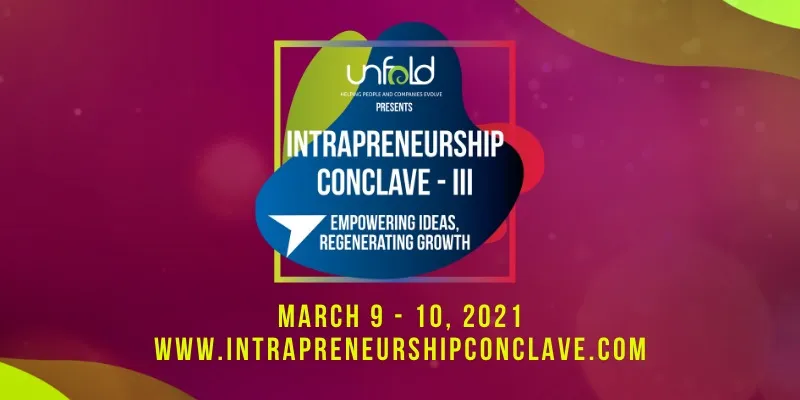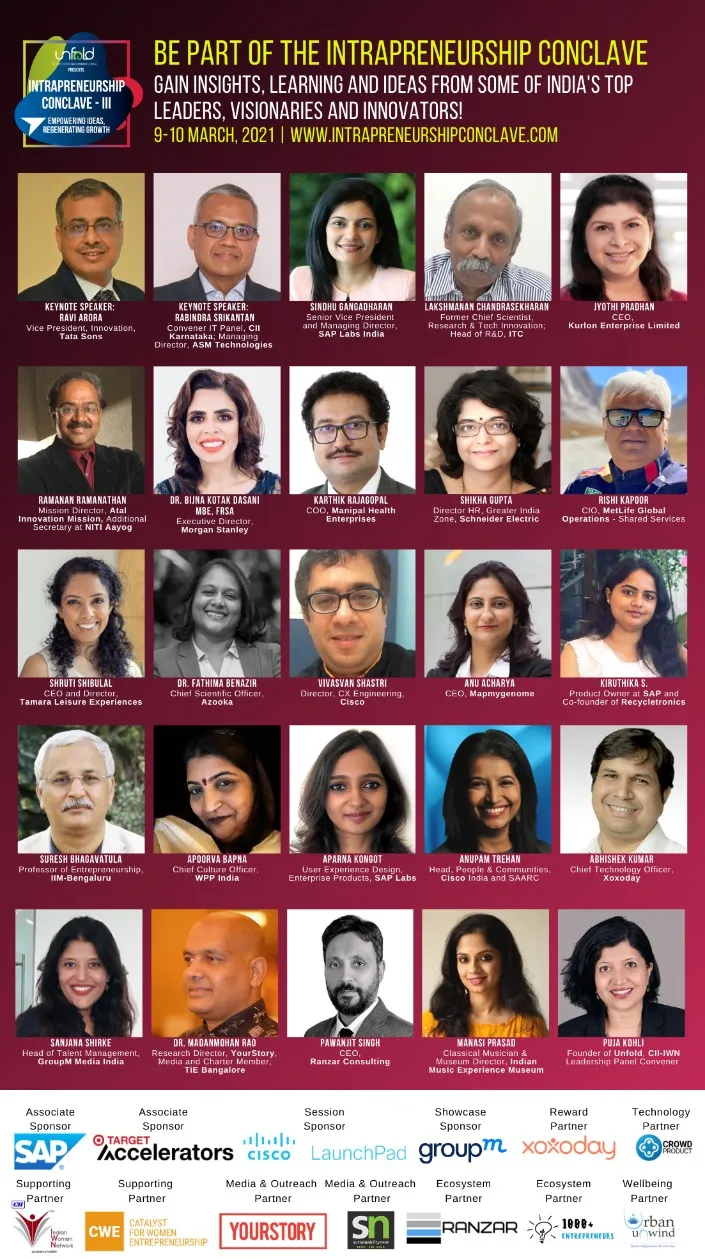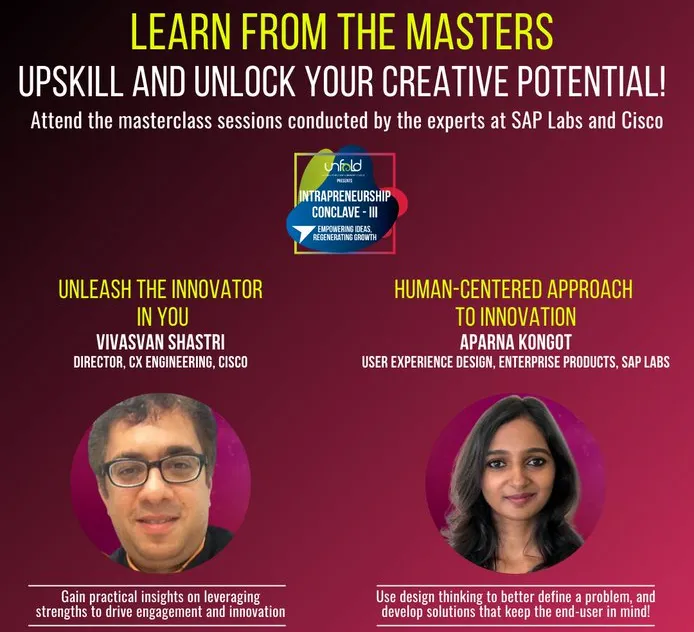Insights and examples: Intrapreneurship Conclave highlights enterprise innovation practices
The third Intrapreneurship Conclave kicks off today, with lessons, stories, and tips on creating a culture of innovation for the pandemic era.
In this preview article on the Intrapreneurship Conclave, we share more examples and insights on enterprise innovation. See Part I, Part II, and Part III of our preview series, as well as our write-up on the 2019 edition and 15-part article series on the CII Global Knowledge Summit.
See also YourStory’s Book Review section with takeaways from 300 titles on creativity, innovation, entrepreneurship, and digital transformation.

Resilience in the pandemic era
The pandemic posed serious challenges for many companies on how to survive, revive, and even thrive in the face of the crisis. But teamwork and resilience helped turn the corner.
“At Cisco, we firmly believe in the power of teams. There are six team rituals that we focused on to keep the morale high,” explains Vivasvan Shastri, Director, Customer Experience (CX) Engineering, Cisco, in a chat with .
He describes these six principles as: Our Best Moments, Strengths Spotting, Trust, Connection, Recognition and Resilience. “These team rituals helped us stay connected as teams,” he says.
Virtual contests also helped the team stay connected through the year, Vivasvan adds. They ranged from a talent show and fitness challenges to treasure hunts, cooking, and even Antakshari.
The lockdowns and aftermath yielded valuable lessons as well. “One thing I learnt as a leader is to be intentional and customise communication with every employee,” Vivasvan explains.
“We appreciate that people at any time are juggling multiple priorities – work, taking care of family, and kids’ education. We need to customise how we interact with each employee,” he emphasises.
Vivasvan also offers three tips (‘3 Es’) for organisational leaders to sustain employee innovations.
Empower everyone. The best ideas can come from anywhere.
Experiment more. You can learn a lot by doing rather than just debating.
Engage more. Sharing which is critical to innovation is linked to engagement. The more engaged a team, the more they will share and innovate.

Opportunity and innovation
The pandemic had a devastating impact on the economy and society, but also opened up opportunities in sectors like healthcare. “As the world went into a lockdown, we realised that testing was crucial for companies to safely reopen, including our own,” recalls Anu Acharya, CEO and Co-founder of .
“We had to build the infrastructure during lockdown, but the team was motivated as testing helps in opening the economy and ensuring that fewer people get infected. The other was that we provided weekly testing for employees, as well as adequate transportation,” she adds.
Her company is a pioneer in the use of genomics tools for personalised preventive healthcare. “We came up with a Genomepatri Risk and Immunity report while the team worked from home,” Anu describes.
The team also came up with ideas on companies that would need regular testing, and which hospitals to approach. Other ideas were on effective ways to be productive during the lockdown, including WFH (work from home).
“All new ideas are discussed immediately during weekly video calls or in-person meetings as time is of the essence and execution has to be immediate,” she explains. Some of the ideas that were implemented were shifts to work round the clock, and 24-hour WhatsApp support for customers.
Anu offers three tips for companies looking to build and sustain an innovative culture. “Hire and retain a good team. Be quick in decision making. Incentivise the team for ideas,” she advises.

Insights and research
Unfold Consulting, the HR consultancy behind the Intrapreneurship Conclaves, has also published frameworks and reports on internal and external ecosystems of corporate innovation.
For example, their ‘4 Ps’ model of intrapreneurship describes purpose, principle, people, and practice as foundations. Levels of innovation maturity range from basic ideas programmes to embedding intrapreneurship in strategy and culture.
An intrapreneur has a risk-taking mindset, an ability to deal with ambiguity, and skills to manage delivery. Intrapreneurship can be learnt, and competency frameworks can be designed and implemented.
The mandate for leaders and governance councils is to create such a culture of experimentation and learning, and drive the transformation agenda. Technology plays a key role here via platforms, channels, and analytics.
One of the research reports is titled A Study on Corporate Accelerators in India: Champions of innovation and collaboration with startups. Participating organisations included Accenture, Axis Bank, Bosch, Brigade REAP, Grant Thornton, IBM, Infosys, Oracle, SAP, Societe Generale, Swiss Re, Target, VMWare, Wipro, and Yes Bank.
See also YourStory’s Startup Hatch section with profiles of accelerators, incubators, co-working spaces and makerspaces.
Another report is titled Institutionalizing Intrapreneurship: A people-centric approach to championing in-house innovation. Participating organisations included Amadeus, Bosch, Cisco, Google, HCL, IBM, McDonald's, MindTree, SAP, Tata Elxsi, Unisys, and VMWare.

The third Intrapreneurship Conclave
The first editions of the Intrapreneurship Conclave were held in 2017 and 2019, with the aim of helping companies focus on creativity and a vibrant culture of experimentation. Early support came from Gifford Pinchot, the author and consultant credited with coining the word ‘intrapreneur.’
The conclaves focus on how firms can democratise innovation, and feature keynotes, panels and masterclasses. The third conclave, with four hours of sessions on two days this week, addresses resilience and innovation in the pandemic era.
Edited by Teja Lele










